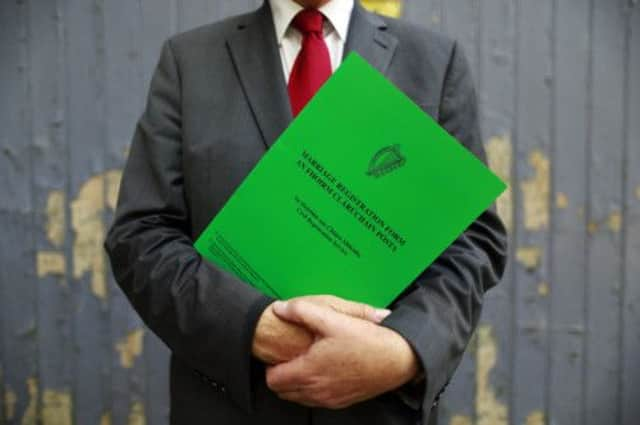Ireland: Unbelievable rise of secular weddings


The Humanist Association of Ireland said it has been inundated by requests for secular weddings, partly due to a collapse in the standing of the Catholic Church in the wake of sex-abuse scandals and as a result of Ireland’s rapid secularisation.
Until now, those who did not want a religious wedding could have only civil ceremonies. Outside of the registrar’s office, only clergy were permitted to perform weddings in Ireland.
Advertisement
Hide AdAdvertisement
Hide AdHowever, statistics show rising demand for non-church weddings. In 1996, 90 per cent of Irish weddings were performed by priests or Church of Ireland ministers. But by 2010 that had fallen to 69 per cent.
The pent-up demand from those who want more than a civil ceremony in a registry office but reject a religious wedding has created a major backlog for the humanist group’s ceremonies director.
Brian Whiteside, initially the only humanist “solemniser” certified to legally marry couples, was already booked well into next year when the civil registry office agreed in late June to approve ten others, taking some of the pressure off him.
“It remains very, very busy,” Mr Whiteside said. “We’re all finding it difficult to keep up with the inquiries. We had 595 inquiries in the first three months of this year.”
The Irish parliament legalised secular wedding services last December, after a ten-year campaign by the Humanist Association. The law went into effect on 1 January.
Brendan Hastings, originally from South Africa, and his Irish bride Suzy Addis had Mr Whiteside preside at their recent humanist wedding in Slane, north of Dublin. Soft modern music accompanied the relaxed ceremony and the main reading was a passage from the 1994 novel Captain Corelli’s Mandolin.
“Basically we are both atheists and didn’t want a religious ceremony,” said Mr Hastings, at 32 a year older than his bride. “Other weddings we have gone to tended to be all about Jesus and we’re not into that. We were both raised as Catholics but kind of gave it up.”
Mr Whiteside, a retired Dublin businessman, said he began presiding at humanist weddings when they were simply a symbolic rather than the official act.
Advertisement
Hide AdAdvertisement
Hide AdThe association also offers secular funerals and naming ceremonies.
Being the only certified humanist celebrant for the first half of the year, Mr Whiteside was officiating at one or two weddings a week. He was scheduled for about 90 weddings this year and about 50 in 2014.
“It became a sort of second career,” he said. “I don’t want to make a business out of this, but it means a lot to me.”
The recent ruling means the work can now be divided among the other solemnisers living in Dublin, Wicklow, Cork and Galway.
The law says solemnisers cannot work for profit. Mr Whiteside said he usually asks €450 (£387) a wedding, depending on the distance he has to travel.
“We don’t have salaries, so we have to have some kind of income,” he said,.
That price is low compared to other countries. The Dutch Humanist Union charges €475 while in Germany and Austria, where humanist weddings cannot replace the cost goes from €650 to more than €1,000.